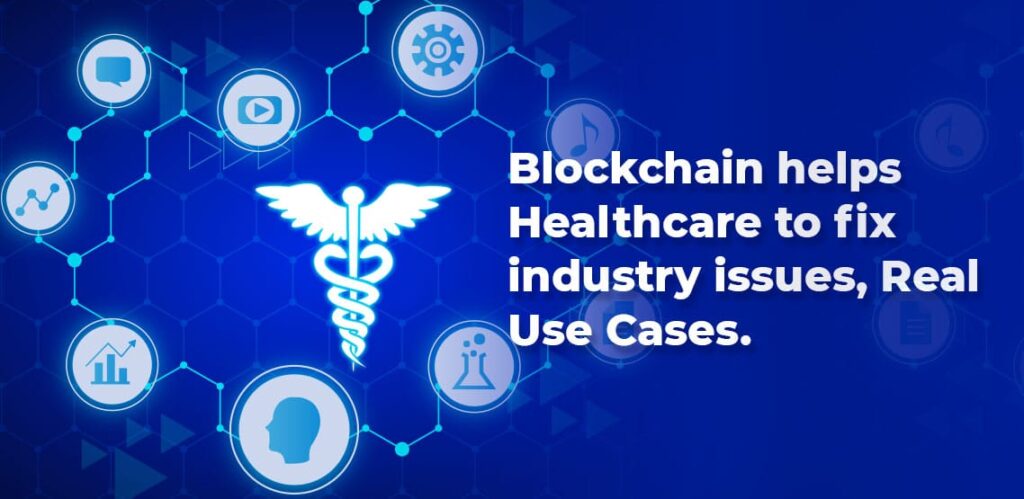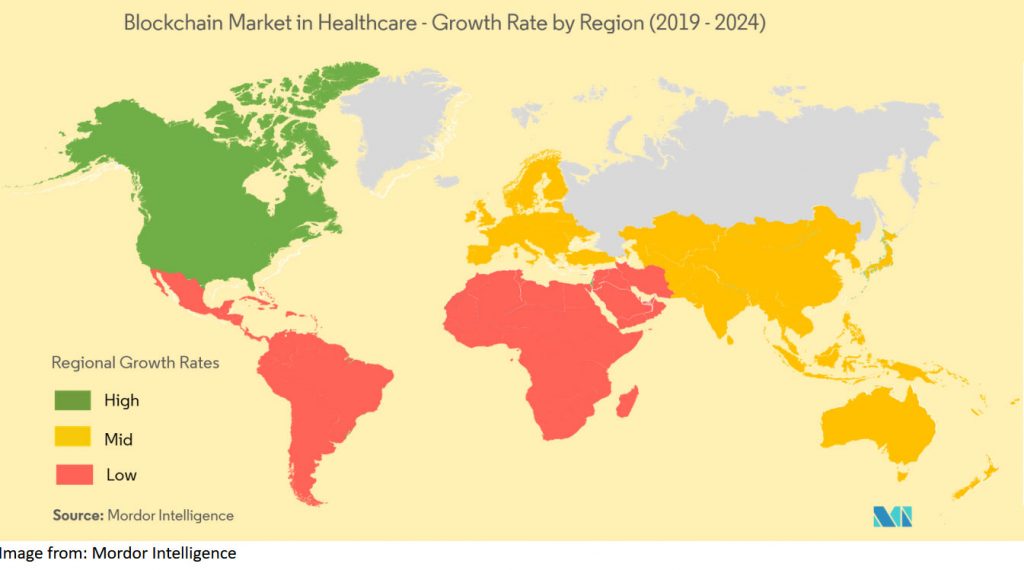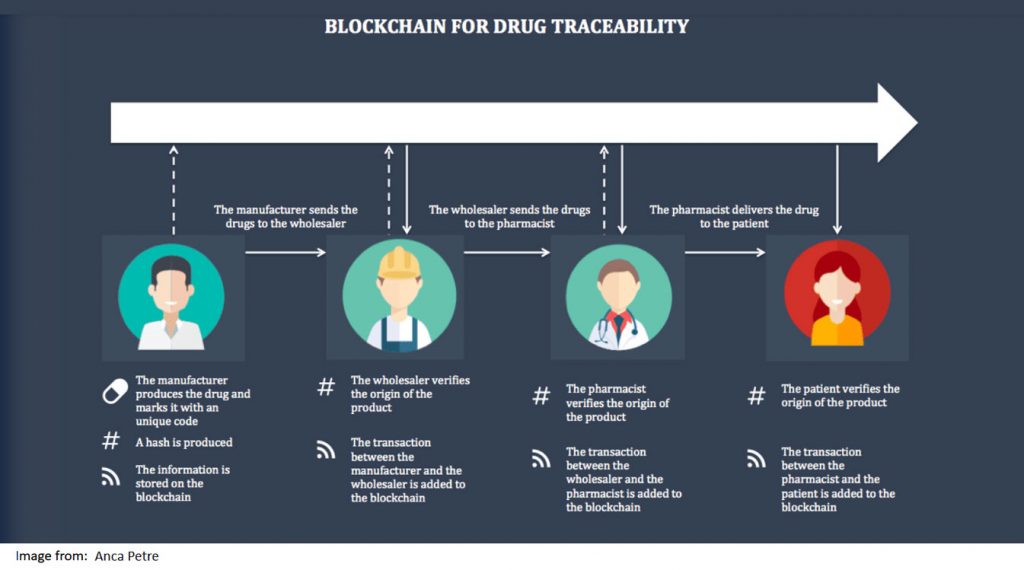How Can Medical Blockchain Help the Healthcare Industry?

Healthcare industry is often known to be intricate and complex. This statement can draw some major controversies. By complex and intricate, here it means that even though this industry has undergone radical innovations in certain aspects like in medicines, drugs, vaccines, clinical trials, and in the adoption of cloud computing, it needs major overhauling
in other aspects and facets. Those are maintenance of patient data, data analysis, and accuracy, drug traceability, supply chain management, and cybersecurity.
Blockchain has the potential of eradicating the issues plaguing the industry and reforming healthcare by keeping the patient at the very crux of the medical ecosystem system and establishing increased security, interoperability as well as privacy of stored patient records. The value of blockchain technology in healthcare was $ 2.12 billion in the year 2019 and is expected to reach $ 3.49 billion by the year 2025, with a CAGR of 8.7% throughout the forecast period, from 2020 to 2025.

No wonder, use cases of blockchain applications in healthcare and scope of blockchain for health records are being explored, experimented, discovered day and night by various blockchain and healthcare companies. By tracking pharmaceuticals, enhancing payment options, and decentralizing data of patient health history, Blockchain has affirmed itself as an irreplaceable tool in healthcare.
Well all that being said and done, this article will reflect upon the numerous errors and missteps that can be averted through incorporating blockchain in healthcare and will discuss how blockchain is presently being used in healthcare.
The things that will be focussed upon and discussed within this blog are:
- What’s blockchain?
- What is Blockchain in Healthcare?
- Which healthcare industry issues can be solved through blockchain?
- Ways how blockchain can be used in the Healthcare Industry
- Advantages of the Medical Healthcare Blockchain
- Predictions about the future of Medical Blockchain
So let’s start with defining Blockchain, how does blockchain help healthcare and how blockchain is used in healthcare.
What’s Blockchain?
The concept of blockchain can be defined as a decentralized system within The concept of blockchain can be defined as a decentralized system within which historical or transactional records are maintained, stored, and recorded, across a peer to peer network of personal computers known as nodes. To illustrate further, it is a public digital ledger that is immovable and quite similar to a database. It relies heavily on established cryptographic techniques.
So you are forgiven if you think Blockchain is mainly about Cryptocurrency. When discussing blockchain, people often link it to cryptos and Bitcoin. But blockchain is much more than cryptocurrency when it comes to the robustness of an application. It is immutable and secure. The network requires verification before a participant records any information. It
enables a trustless collaboration, as the information gets stored and accordingly is shared across all the network participants, keeping an immutable audit trail of all the past and ongoing interactions. It is indeed the kind of disruptive technology that can create a tremendous seismic shift within any industry and just about exactly what healthcare needs.
What Is Blockchain in Healthcare?
Continuing from the above discussion, blockchain is a distributed, and decentralized digital ledger which is filled with a plethora of highly encrypted, time-stamped virtual records that are continuously updated. Without this technology, the existence of cryptocurrencies such as Ethereum or Bitcoin would not have been possible. Each particular unit of the said digital ledger is known as a block. The Crypto Technology binds all of these blocks together making them literally immutable.
No matter how you can look at it, Healthcare combined with Blockchain is a match made in heaven. To state the glaring and undeniable fact of the medical industry becoming a victim of numerous security breaches almost on a daily basis, it is a no-brainer to apply this technology to seal all of the loopholes. Also, there is much more use to blockchain than this, which is why intelligence firms are exploring the scope of blockchain technology in
healthcare and blockchain in medicine. A blockchain monitored health information exchange could unleash the true potential of interoperability. Its systems can curtail or diminish the costs and friction of the current intermediaries.
To further illustrate, the term blockchain for healthcare holds immense scope and comprehensive significance for the stakeholders. This technology has the capability of connecting the fragmented systems which can produce insights to better examine the value of personalized care. Capitalizing & investing in the prospects of blockchain for medical records is already getting widespread attention.
The adoption and integration of blockchain could save the costs of the healthcare industry annually up to $100 to $150 billion by 2025 in Information Technology and data breach- related costs, support function, operation, and personnel costs, and through reducing the sale and marketing of counterfeit and fraud products.
Which healthcare industry issues can be solved through blockchain?
There are numerous data challenges which the Big Pharma is grappling with. Let’s see the ways that Blockchain helps healthcare to solve those:
Drug Traceability
Drug falsification and counterfeiting has been a distressing issue afflicting the healthcare industry for decades. The Organization of Health Research Funding has put forth some statistical data related to it:
- 10-30% of the drugs that are released into the markets of the developing economies are counterfeited or cloned versions.
- The market of these counterfeited drugs annually stands at $200 billion.
- Online sales of these cloned drugs annually accounts for $80 billion.
- Most of these drugs are either manufactured in China or India.
- About 60 distinct types of Pfizer medicines and products were being counterfeited in 2014. WHO assessed that 16% of these counterfeited drugs were made up of wrong ingredients, or consisted of the wrong level of ingredients putting the future of healthcare at a high risk.
The counterfeited products being highly different from the original product in both quality and composition can be dangerous and critical to the patients as the products do not have the active ingredients that they claim they do. So they are unable to treat and furthur, cure the disease for which they are arbitrarily recommended. Moreover, it can lead to the patient’s death by triggering unexpected effects. It has also been estimated that the consequences of this widespread issue can cause an annual loss of 10.2 billion euros to the European pharmaceutical sector.
How Blockchain can help?
The blockchain technology is known for its immutability and security. All past and new transactions are recorded in the form of blocks that are time stamped and immutable. That ensures the recorded information of being sacrosanct and ultimate. The mechanism does not allow one to revamp and alter the information as anyone desires to and further helps to easily track any product.

The main issue that the stakeholders face in the current times is they do not have the conformity of the origin of the products released in the market. They have an incomplete vision of the whole supply map. This is how the fake drugs enter the supply chain and reach the patients.
With stakeholders having hold of each recorded information and history of transactions through blockchain, they can keep a track of each product that enters the supply chain and gets to the market.
Moreover, if the need to withdraw any batch from the market due to a certain issue they can track down the products easily and do the job without any complications. If a certain issue arises and they have to cease the release of a product or withdraw a batch, they can easily track the products down and do the job hassle-free.
Clinical Trials
The before and after of the various phases of clinical trial, produces a considerable amount of patient data and health information. Those are blood test reports, quality reports, statistics, health surveys, clinical documentation from a massive group of people. The whole process is so rigorous and prolonged, that makes it hard to oversee and track everyone. Mistakes are made, unintentionally and often intentionally as well. As the Pharmaceutical giants and sponsors back these trials, by investing their millions of dollars on them, the financial backlashes are also huge,
depending on the end result. If the trial results are successful leading to the
discovery of a new vaccine or drug, then there is a huge profit, or a massive financial loss, as the aftermath. To avoid the latter, fraudulence often becomes a common occurrence. That starts with the manipulating, altering or hiding of vital data that could literally compromise the advancement of the clinical trial. This leads to scandals jeopardizing the reputation of the organization among the authoritative agencies and regulatory patients.
How Blockchain can help?
When you search anything on the network using a keyword, Blockchain will present you the search results showing you the presence of any document or record. If you want to add new data through the transactional model, the nodes of the ledger will need to give their consent that it is logical and legitimate with the history of the data stored. If any network participant tries to alter an existing pile of health information,to their desire they would need to modify that information in all of the network computers. This essential feature of the blockchain systems prevents the
alteration of data in regards to the clinical trials. All of the trial data is assigned a distinctive code that is specific to the document content. If a healthcare professional goes through the stored data and starts suspecting its authenticity, they can seamlessly verify that by comparing it to the original information that was stored in the blockchain system. To do so they need to run the data that will produce a new code. They need to compare that new code to the original one. If it is the same, then that means no kind of tampering has been done to the stored health information. This will boost collaboration among the healthcare professionals and third parties
like Pharmacy Companies paving the path to more scientific advances especially when it comes to curing rare diseases.
Patient Data Management
There are two main issues that the healthcare providers doing patient data
management is currently facing. First is, not all of the patients are the same type, as all have their own inter-individual variability. A cure recommended to one patient might not be prescribed to another patient as it is not suitable for them. It is for this reason that the access to their medical records is required, to create personalized and patient-centered treatments.
Second is, storing that information and giving access to that information, or sharing it among the leads of the medical community is a compelling challenge. A secure network is the way to go, for sharing personalized medical data that is highly sensitive. Scientific discoveries require the medical data to be stored in solid cybersecurity structures and the lack of it is a major obstacle to their progress. Also the lack of a common database results in this information to be stored as bits and pieces in numerous locations, that creates a huge problem for the researchers. When they need to access or track back on this information, they have to search through the many locations that further slows down the progress.
Also, there is the issue of data ownership. A patient cannot be given full ownership of his or her medical records. They can alter or delete any information as he/she pleases. This could have serious repercussions on his health putting the patient safety at risk. Then again the drawback to it is, if the patient is not authorized to have ownership of the data, he/she will not have any idea of the people accessing and using it.
How Blockchain can help?

Blockchain is built on established cryptographic techniques, that gives the suitable cybersecurity structure for sharing the data. While recording information of each patient, healthcare providers document the patient’s name, date of birth, prescription, procedures undertaken, and ambulatory records in EHR format. The cloud computing or the existing databases store this data. All of these data sources are tagged to a particular hash with the patient’s assigned public ID within the blockchain system. Patient manages the data access through the mode of Smart Contracts.
Stakeholders can search, know the whereabouts and get hold of the data through an API. An API will reveal the personalized health information, not showing anything more than that such as the identity of the patient. If the patient desires to show their entire medical information to any stakeholder, they can do so with the help of Smart Contracts. The Smart Contracts allows them to have control over the access to their own medical records, all done through the mode of an API.
Ways how blockchain can be used in the Healthcare Industry
The medical industry is heavily reliant on Blockchain alongside robust technologies like Machine Learning & Artificial Intelligence. Here are some real use cases of how and through which collaborations is Blockchain is changing the Healthcare Industry:
Drug Supply Chain Transformation
A market intelligence report by a credible research firm says, Blockchain technology has the ability to enhance the functionality, security, and data provenance of the pharmaceutical supply chain if implemented efficiently.
The supply chain of the medical industry has been exploring ways of combating the problem of counterfeiting and falsification of drugs. Blockchain based companies like Viant are providing solutions related to the supply chain to pharma giants like GlaxoSmithKline to completely eradicate the issue. The application is based on the tracking technology of blockchain which will fine-tune the supply chain of the medical industry.
Bookkeeping of Clinical Trials
Given the present scenario, clinical trials have become the new normal. Keeping a track of their financials with accuracy through the bookkeeping process is a crucial need of the hour. It is for the seamless functioning and evaluation of the clinical trials. Here’s where blockchain firms have invented ways to streamline the process of bookkeeping and financial reporting. Boehringer Ingelheim has tied up with IBM to create a blockchain-powered system for its bookkeeping process. The database is for
accentuating their very first project of clinical trials. Through this, the various aspects of the bookkeeping process will be enhanced up to tenfold.
Process of Form Filling
Anytime someone is required to be admitted to hospital due to a serious illness, the task of admission takes a huge time cause of the arduous process of filling loads of forms. It feels seemingly as exhausting as conquering Mt. Everest! Blockchain can automate the task, saving our time and energy and companies like Kalibrate Blockchain are doing so. It has created FormDrop which is a mobile application running on a blockchain-powered engine called Universal Patient Index. Through this app, any person will be able to fill up the forms ahead of time, before prepping to go to a healthcare facility. By doing so, they can save their time by avoiding standing in
lines. This will aid in increasing the productivity of healthcare employees.
Advantages of the Medical Healthcare Blockchain
Based on the practical applications of Blockchain and the healthcare industry issues that it can fix, the following benefits and advantages can be derived from the usage of Blockchain Technology:
Robust Monitoring
One of the key things that the network management team of healthcare needs right now is overseeing, powerful monitoring of all kinds of transactions. The feature that sets Blockchain apart from other healthcare management systems is that it documents all kinds of transactions in the form of a decentralized record. It is precise and transparent to the core that effectively saves time, effort, and cost, thus also saving the hassle of constant management.
Enhanced Collaboration
A big amount of success of any healthcare initiative depends largely on the people involved like third parties, professionals and researchers. Blockchain technology enhances the collaboration among these participants with the help of its distributed ledger technology through which they can provide deep insights and do group research.
Data Protection
As deliberated in the previous sections, the main issue that the healthcare industry is facing is the leakage of significant data and it being used for malicious means and for other vested interests. Another focus area is that the participants and parties involved in the database have access to the most updated and authentic patient data and diagnosis information. Blockchain is made up of the most advanced cryptographic aspects, which makes it immutable. That facilitates data authenticity accompanied by a digital signature, along with foolproof data security stabilizing the issues of security and trust.
Cost-Efficient Cures and Process Simplification
Smooth, streamlined, quality data sharing, and distribution across all the key network participants and healthcare providers helps in creating cost-effective treatments and sophisticated cures for the numerous diseases.
The fully organized step by step process documents transactions in the form of electronic health records, or EHRs which is the all exclusive digital format. That not only increases the security aspect but simplifies complex processes such as billing and other procedures eliminating the need of multiple validations and middlemen who act on behalf of the other entities.
Predictions about the future of medical blockchain
The scope of Blockchain in healthcare looks super up-and-coming and promising as it helps to solve some of the pressing issues afflicting the industry. As Blockchain is decentralized unlike the majority of the healthcare records that are centralized, we envision a progressive future. A future where blockchain acts as an element of a system in which patients will become stewards of their own medical data, in place of relying on a central source. Of Course, the application of blockchain comes with its own set of technical challenges. The process and number of steps to record, find and get the data can be complex and numerous, but with the help of emerging technologies like Machine Learning and AI, these problems will get resolved eventually.
Conclusion
To answer the question, can blockchain be used in healthcare? Of Course yes. Blockchain will play a crucial role in improving the healthcare system reforming the future of healthcare. The vision of providing personalized healthcare does not seem like an impossible dream now with Medical Blockchain storing and securing massive amounts of data at scale. We are hoping that the production applications that are blockchain-powered will become commonplace by next year.
Techexactly works with organizations that are facing unprecedented challenges in managing their healthcare supply chain to imbibe them with capabilities necessary to thrive in an increasingly demanding ecosystem and emerge stronger. We collaborate with companies across the industry value chain starting from Big Pharma to Biotech, from Medical Device to
CRO – to thrive, grow, and innovate, from strategy through to the execution stage.
Want to know about our services? Go ahead and schedule a time to talk!
